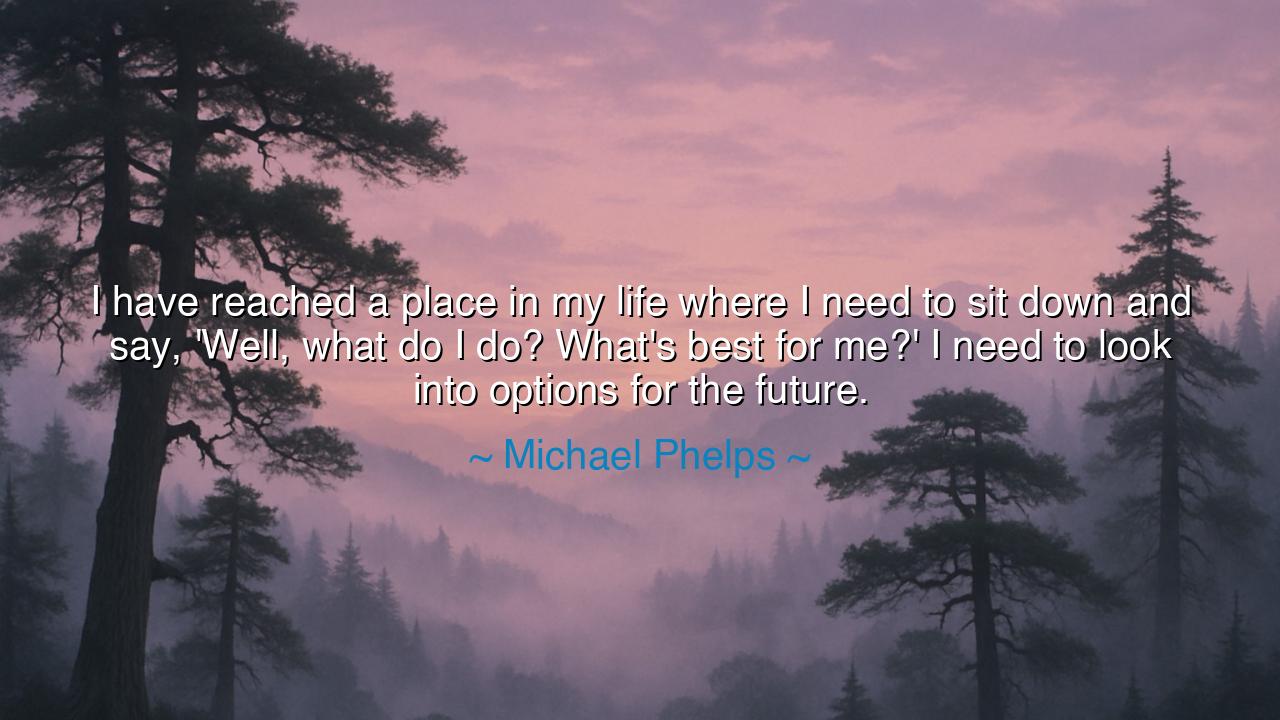
I have reached a place in my life where I need to sit down and
I have reached a place in my life where I need to sit down and say, 'Well, what do I do? What's best for me?' I need to look into options for the future.






"I have reached a place in my life where I need to sit down and say, 'Well, what do I do? What's best for me?' I need to look into options for the future." These words, spoken by Michael Phelps, capture a profound moment of reflection that each of us encounters at various points in our lives—the moment when we realize that the journey we are on must be reassessed. Phelps, a man who achieved the pinnacle of success in the world of swimming, has come to understand that there is more to life than accolades and competition. He stands at a crossroads, seeking the path that aligns with his true purpose, a purpose that may evolve beyond the achievements he has already earned. His words speak to the universal experience of self-reflection, growth, and the need to reassess one’s purpose in the face of success or after a long period of dedication to a singular goal.
To reflect on one’s life and future is not a sign of weakness or uncertainty, but of wisdom. The ancients knew that a life well-lived is one that is constantly evolving, constantly shifting its focus. Socrates famously stated, “An unexamined life is not worth living,” a call to all who hear it to look deeply within and seek purpose, meaning, and direction. Just as the philosopher urged his followers to continually search for truth, Phelps too reflects on his past and seeks to understand what the future holds for him beyond the lanes of a pool. It is a testament to his self-awareness that he recognizes the need to pause, reassess, and envision what truly serves his well-being in this new phase of life.
Consider the ancient warrior, who, after many victories on the battlefield, must eventually face the question: What comes next? After all the years of struggle, of battle, of relentless striving, what is left to conquer? The great Greek hero Achilles, in his later years, sought solace from his victories, realizing that war and glory alone could not bring him peace. Achilles sought fulfillment beyond the physical realm, and though his path was tragic, it was one marked by introspection. Phelps, like Achilles, stands at a point where he must transition from the pursuit of victory to the deeper quest for personal fulfillment. He must now ask: What is the best path forward, not as an athlete, but as a man seeking meaning in a world beyond competition.
Phelps’ journey also mirrors the stories of countless individuals who have reached the zenith of their careers and found themselves standing at the edge of something new. Muhammad Ali, the legendary boxer, was once consumed by the pursuit of championships and the glory of victory, but in his later years, he struggled to find peace and purpose beyond his titles. His battles in the ring gave way to a greater battle for identity and legacy. Phelps, having conquered the swimming world and broken records that may never be surpassed, now stands at a similar crossroads, seeking to find his true purpose beyond the sport. The questions he asks himself reflect a universal truth—that success is not always enough to sustain inner peace.
The lesson from Phelps’ words is both humbling and empowering. It reminds us all that no matter how high we climb or how much we achieve, there comes a time when we must pause and look inward. Success, achievement, and accolades may provide temporary satisfaction, but lasting fulfillment lies in the ability to continually reassess our goals, to ask deep questions, and to seek the paths that nurture our soul. Phelps' call for self-reflection is a reminder that life is a journey, and that journey is not solely about the destination, but the choices we make along the way. Even the greatest among us must redefine our paths as we grow, learning to embrace new challenges, new goals, and new definitions of success.
In our own lives, this moment of reflection is an essential practice. It is easy to get caught up in the momentum of achievement, to chase after external recognition without ever considering what we truly want from life. The key is to pause, just as Phelps has done, and ask ourselves: What is it that I truly seek? What makes my life meaningful? It is through these questions that we begin to craft a future aligned with our values and well-being.
Let us, like Phelps, understand that the end of one chapter is not the end of the story, but the beginning of a new phase of growth. The future is not something that simply happens to us; it is something we actively shape through thoughtful reflection and intentional action. When we approach life with the mindset of introspection, we open ourselves to new possibilities, allowing us to redefine success not by past achievements but by the fulfillment we find in the pursuit of our true purpose. Just as Socrates urged the examination of one’s life, so too must we embrace the constant cycle of reflection, growth, and renewal in order to live fully and authentically.






AAdministratorAdministrator
Welcome, honored guests. Please leave a comment, we will respond soon